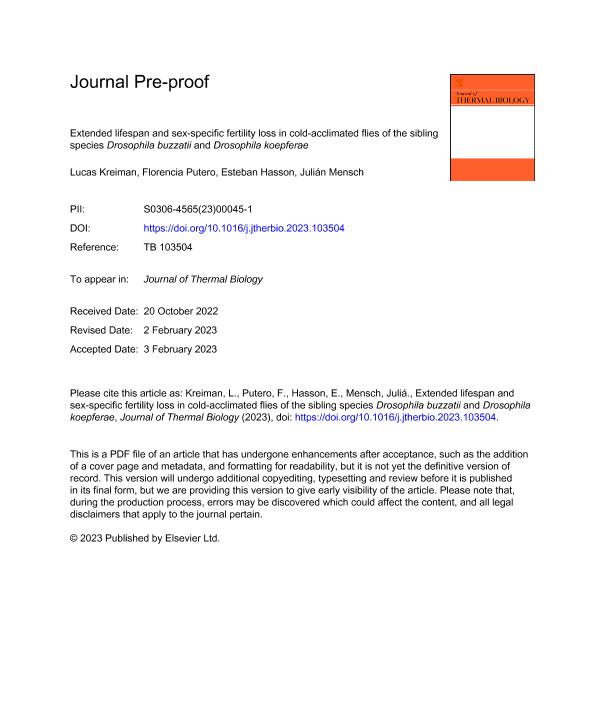Artículo
Extended lifespan and sex-specific fertility loss in cold-acclimated flies of the sibling species Drosophila buzzatii and Drosophila koepferae
Fecha de publicación:
02/2023
Editorial:
Pergamon-Elsevier Science Ltd
Revista:
Journal of Thermal Biology
ISSN:
0306-4565
Idioma:
Inglés
Tipo de recurso:
Artículo publicado
Clasificación temática:
Resumen
Survival and reproduction are the core elements of Darwinian fitness. In the context of a fixed energy budget, organisms tend to allocate resources in order to maximize one at the expense of the other, in what has been called the lifespan-reproduction trade-off. Reproductive arrest and extended lifespan are common responses to low temperatures in many insects including fruit flies. In this study, we aim to understand the overwintering strategy of two closely-related Drosophila species with contrasting distribution ranges. We compared survival, lifespan, ovarian maturation, and reproductive output (fecundity and fertility) of virgin and mated adults of both Drosophila buzzatii and Drosophila koepferae after long-term cold exposure at dormancy-inducing conditions (10 °C, 10:14 L:D) and controls (25 °C, 12:12 L:D). Virgin flies of D. buzzatii showed the longest lifespan (averaging 102 days) under dormancy-inducing conditions. Cold-induced reproductive arrest preserves reproductive capacity mainly in virgin females that mated after reproductive dormancy, indicating that males were much more susceptible to fertility loss than females, in both species. Notably, females of D. buzzatii were capable of protecting stored sperm from cold damage and produced viable progeny. Even if, in D. buzzatii, fertility of flies mated after the cold-exposure was extremely low, cold temperature likely sterilized D. koepferae males, indicating that cold carry-over effects are stronger for the species with the shorter lifespan. Such species-specific effects of low temperature over fitness likely contributed to the divergence of these closely-related species and to the spread of D. buzzatii into cooler environments.
Palabras clave:
COLD ADAPTATION
,
FRUIT FLY
,
OVERWINTERING
,
REPRODUCTIVE DORMANCY
Archivos asociados
Licencia
Identificadores
Colecciones
Articulos(IBBEA)
Articulos de INSTITUTO DE BIODIVERSIDAD Y BIOLOGIA EXPERIMENTAL Y APLICADA
Articulos de INSTITUTO DE BIODIVERSIDAD Y BIOLOGIA EXPERIMENTAL Y APLICADA
Articulos(IEGEBA)
Articulos de INSTITUTO DE ECOLOGIA, GENETICA Y EVOLUCION DE BS. AS
Articulos de INSTITUTO DE ECOLOGIA, GENETICA Y EVOLUCION DE BS. AS
Articulos(OCA CIUDAD UNIVERSITARIA)
Articulos de OFICINA DE COORDINACION ADMINISTRATIVA CIUDAD UNIVERSITARIA
Articulos de OFICINA DE COORDINACION ADMINISTRATIVA CIUDAD UNIVERSITARIA
Citación
Kreiman, Lucas Eli; Putero, Florencia Aldana; Hasson, Esteban Ruben; Mensch, Julian; Extended lifespan and sex-specific fertility loss in cold-acclimated flies of the sibling species Drosophila buzzatii and Drosophila koepferae; Pergamon-Elsevier Science Ltd; Journal of Thermal Biology; 113; 2-2023; 1-8
Compartir
Altmétricas




